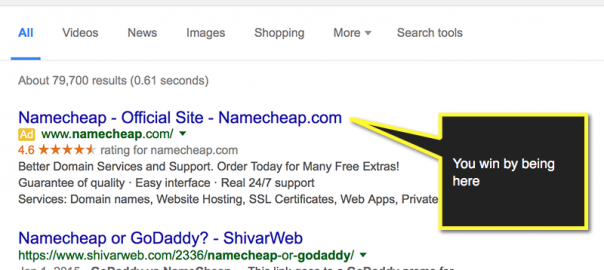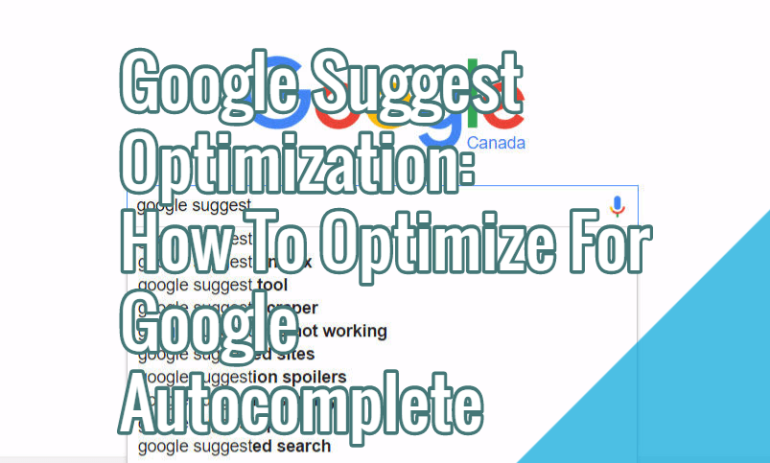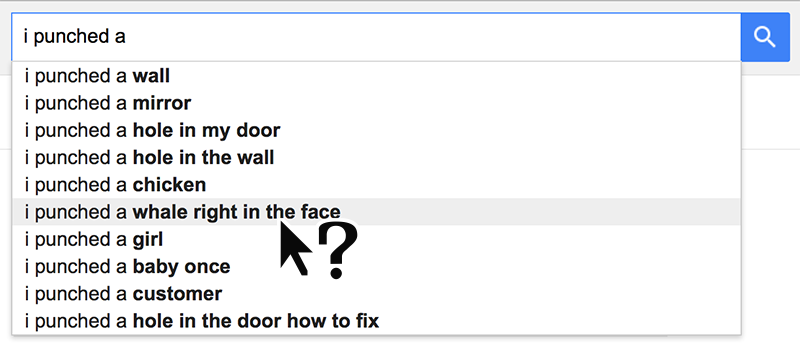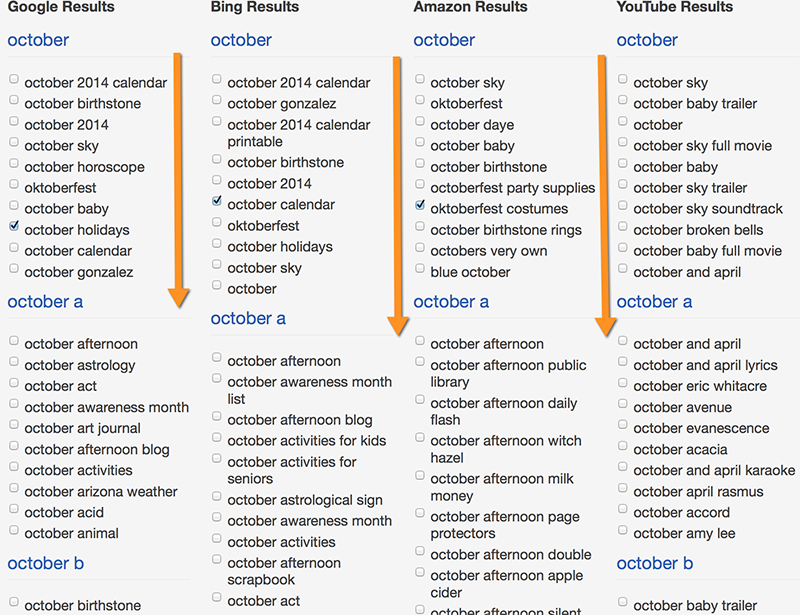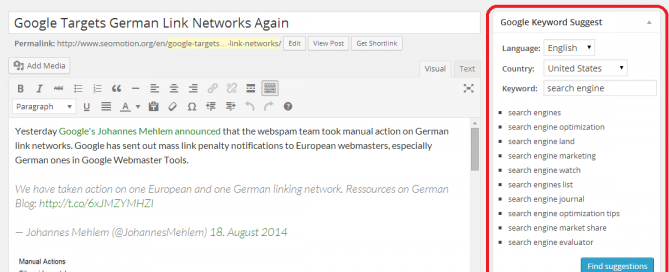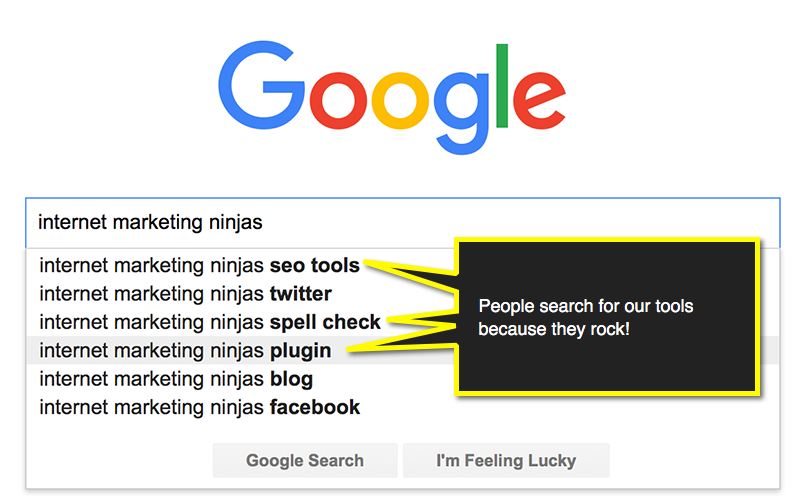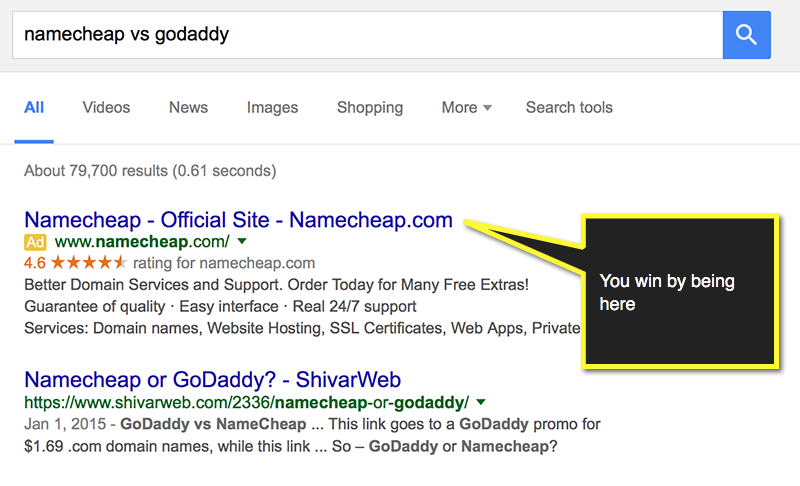Google Suggest may often be the most random collection of auto-corrections you will ever see. I once saw a screenshot that took “I punched a…” and it auto-suggested “…whale right in the face”.
Oftentimes Google Suggest is a strange animal… But there is no denying it is affecting a user’s behavior, tweaking their query and often distracting them from what they were initially searching.
Ignoring Google Suggest results means missing out, often letting your potential customers go elsewhere. In many cases, it means seeing your customer search for a competitor (think of “Your Brand alternatives” Google auto-complete results) or a free option to replace your offer.
With Google Instant being around for years no (powering search results as you type), there’s no excuse for not paying attention to important and relevant Google auto-complete results.
How does it work? The amount of influence you have on Google Suggest results are minimal, but you can adapt your pages to better cater to them.
How Google Suggest Actually Selects Its Auto-completions
The algorithm is designed to reflect the range of info on the web. So just like the web, the search terms you see might seem strange or surprising. (Source: Google)
You have four primary factors associated with Google Suggest algorithm:
- The frequency keyword chains are searched
- The time in which keywords are searched (the popularity of phrases is always changing)
- The geographical location of the user doing the search
- The search history of each separate user.
Obviously, you only have so much control when it comes to these four factors. But you can adapt your strategy to what you get. For example,if you cannot create major events that would boost a specific key-phrase at any given moment, you can monitor and use trending keywords on your site to up your results for auto-suggestions already coming up on Google during that time.
Google Suggest and Reputation Management
The biggest issue Google Suggest tends to pose is in reputation management though. It’s what tends to push you towards manipulating (or trying to manipulate) suggestions. If people have negative things to say about you (or a similar sounding brand, or even industry as a whole), your auto-suggestions are going to be negative. It usually makes a reputation management crisis even worse and longer lasting.
A single scandal can impact the way your company is suggested for a long time. For example, when Domino’s Pizza employees posted a video of themselves doing disgusting things to food they claimed was going out to customers, Google Suggest was automatically pulling terms like “gross video when the brand was searched. In fact, Domino’s Pizza Video was still bringing up “Gross Video” as one of its primary suggestions years later.
In most cases, Google suggest might potentially steer the user in the wrong direction even without prior reputation scandal having taken place. Think about Google suggesting they search for:
- Your product alternatives
- Your company versus your direct competitor
- Your SAAS program free access or a free hack
- Your book free download, etc
Use Keywords The Traditional (“Old-School”) SEO Way
We all know the usual methods of using SEO for Google results. A lot of your efforts for auto-suggest are going to fall under the same heading. You want well-crafted titles, good descriptions, well written and relevant content with carefully selected keywords, and mentions on other sites with those keywords.
While optimizing for “keyword strings” is fast going into the past, keep in mind that Google Suggest is still focused on keyword phrases (although this is gradually changing either) and those keyword phrases are also bold in search results (improving the click-through)
These two free tools will help you dive deeper into Google Auto-complete suggestions allowing you to generate more keyword phrases to optimize your copy for.
For bloggers, there’s a great WordPress plugin that generates Google suggestions right inside your WordPress dashboard while you are still composing an article which i find an awesome idea!
Launch Trends
Launching trends to prompt Google search for it is easier these days thanks to social media. Here are some specific ideas:
- Sponsor a major event (And launch a contest to get people search for details)
- Launch a social media contest and invest in social media ads to get the word going
- Set up a Twitter chat involving major influencers
- Create a super useful free guide or a free tool and associate it heavily with your brand
Buy Ads for Unwanted Suggestions
Sometimes you cannot do anything to force the term out of suggestions: But at least you can be there if you pay to be on top of everyone else.
Yes, it may seem unfair to pay for something that shouldn’t be even suggested but it’s better to be there than to let others own the search.
Mechanical Turk Offers Aggressive Solution
I’ve had a product and the top suggestion of its name was showing “bot” word pushing our future users to find an automated way to abuse our platform. It was destroying the quality of our product because our new users were starting over by using a spammy bot we were fighting like crazy…
That being said, some things are in need of desperate measure and one of such measures is using cheap crowd-sourcing platforms to push the unwanted suggestions down by emulating a new trend.
I cannot and will not recommend doing it but I couldn’t help including this tactic in this article for the sake if its completeness.
Sometimes you cannot do without mercenary tactics to get the job done. Mechanical Turk has become a popular option for companies that want to brute force away potentially harmful Google Suggest results, and replace them with more flattering ones. It sounds a bit shady, but it isn’t technically against the Google T&S (yet).
Basically, you set tasks – in this case, flooding Google and other search engines with your own keywords associated with your industry and brand. Human workers who are contracted for the task through their system take on the job.
Likewise, some people suggest paying for clicks to important search results. (through legit systems like PayPal ads and Twitter ads). I personally haven’t tested either of the methods in this section, so I cannot comment on results.
Let Us Know How You Do!
Have you been trying these or any other tactics to influence Google Suggest? We would love to hear about your results. Leave any studies, comments or suggestions below!
Hand-Picked Related Articles:
- The 15 Greatest Google Autocomplete Fails
- How To Use Google Suggest With Your Own Google Analytics Data
- How to Deal with Google Suggest Defamation
About the Author: Ann Smarty
Google Suggest Optimization: How To Optimize For Google Autocomplete
The post Google Suggest Optimization: How To Optimize For Google Autocomplete appeared first on Search Engine People Blog.
Search Engine People Blog(97)
Report Post